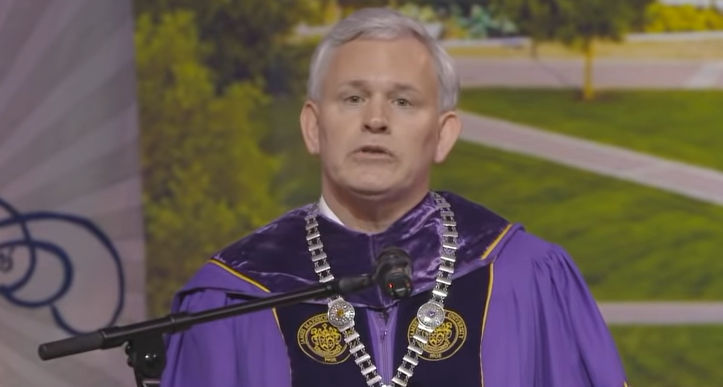
James Madison University Jon Alger. To view his commencement address, click here. Scroll to the 21-minute mark to hear the highlights noted below.
by James A. Bacon
Compare and contrast the visions for the future offered in the commencement addresses of B.K. Fulton to the da Vinci School at Virginia Commonwealth University (see previous post) and that of James Madison President Jon Alger (above). Both expressed faith and optimism in the future, and both encouraged young people to go forth and do great things — as one would expect on such an occasion. But where Fulton celebrated the American spirit of enterprise and innovation, especially among “people on the margin,” Alger had a very different emphasis.
It’s time for a civic renaissance in our nation, which can be led by institutions of higher education, and most of all by our recent graduates,” Alger said. ” It’s a time when we need to strengthen our focus on the public good in new ways and to deal honestly and boldly with the shortcomings and inequities that plague our society in areas such as access to health care, education, the social safety net, and reliable technology, among many others.”
Your generation has already shown us that you can provide leadership on big issues like climate change. You understand that we share responsibilities as stewards of this earth for future generations. Thus, even as we seek to recover from the immediate public health and economic aspects of this crisis, I hope you will use your JMU education to lead us in civil dialogue and debate about what comes next.
Look, it’s important to be stewards of the environment. It’s important to work towards a more just and equitable society. Those are entirely appropriate areas of emphasis for higher education. But there are other values worth celebrating. Honor. Integrity. Self discipline. Vigor. Enterprise. Exploration. Innovation. Wealth creation. Expansion of opportunity to all.
There are noble pursuits that don’t entail saving the world from the problems that preoccupy liberal/progressive academics. I’d like to see them celebrated, too. One of Alger’s predecessors, Ron Carrier — the man who built the modern JMU — was comfortable with those classic values. He saw JMU as an institution that would give young people the skills to fully participate in a modern, science- and technology-driven economy. It saddens me to hear how JMU’s vision has been downsized to advancing a liberal/progressive agenda.
How about “strengthening our focus” on what makes America great, and how to make it greater — for all? How about exploring the successes of Americans working together in civil society to solve pressing social and environmental challenges? How about exposing the shortcomings and inequities created by those who wield government power? How about dealing “honestly and boldly” with the role of the higher-ed establishment in perpetuating social and economic inequality while creating comfortable sinecures for administrators and tenured faculty?
Insofar as Alger’s speech typifies the self-serving mindsets of public university administrators generally, it makes clear that higher-ed is facing a crisis much bigger than the COVID-19 crisis. Higher-ed is facing a crisis of values. Higher-ed has embraced priorities and a way of thinking that is antithetical to at least half the population. This is an industry that is ripe for disruption.


